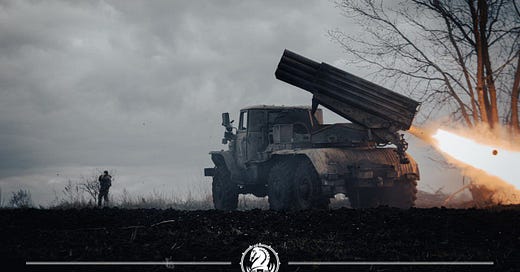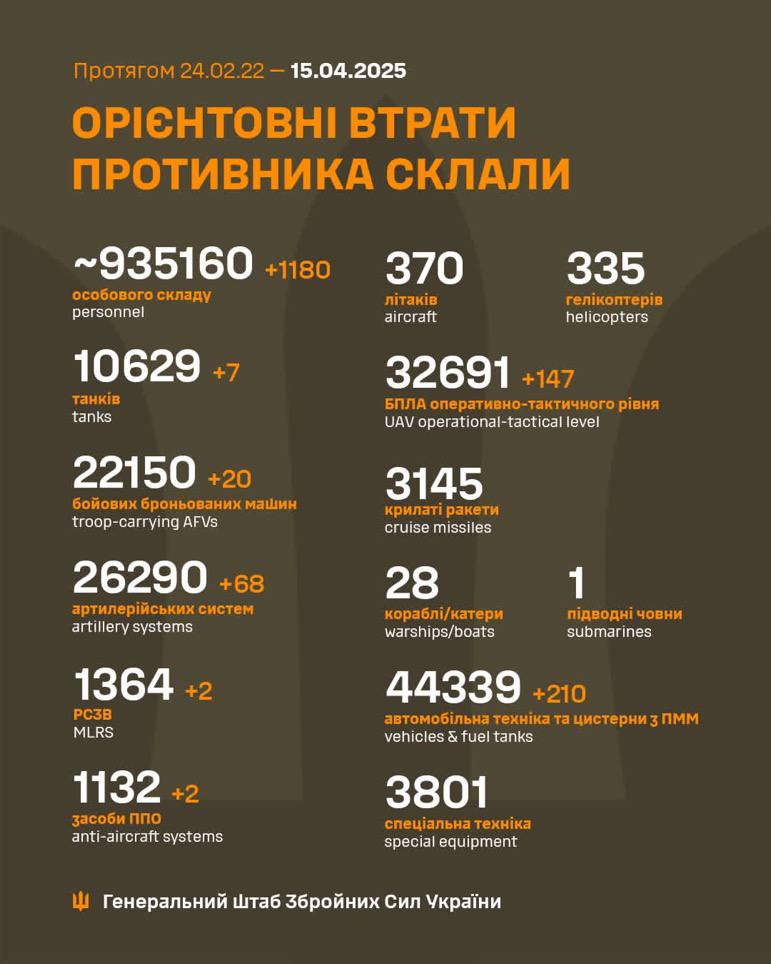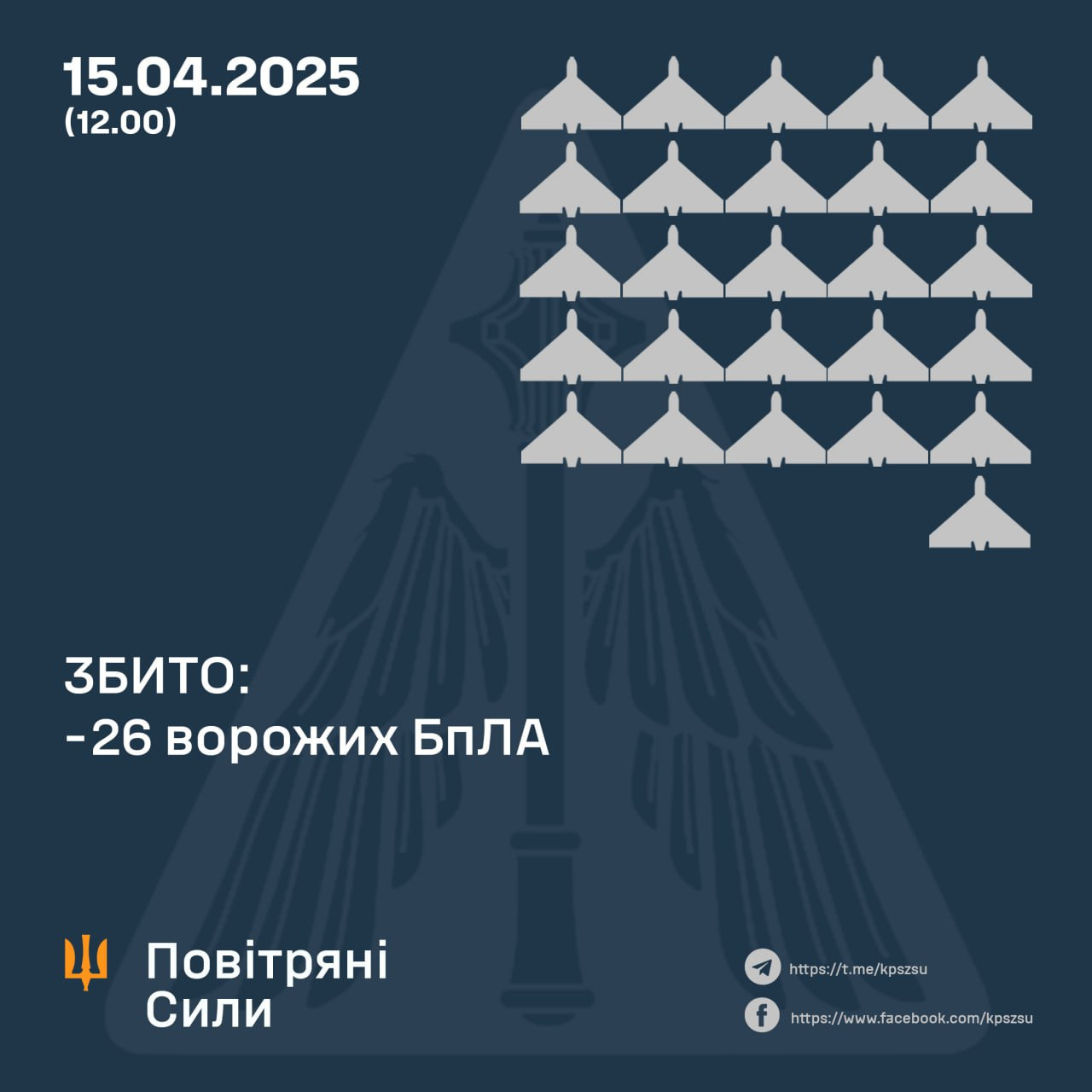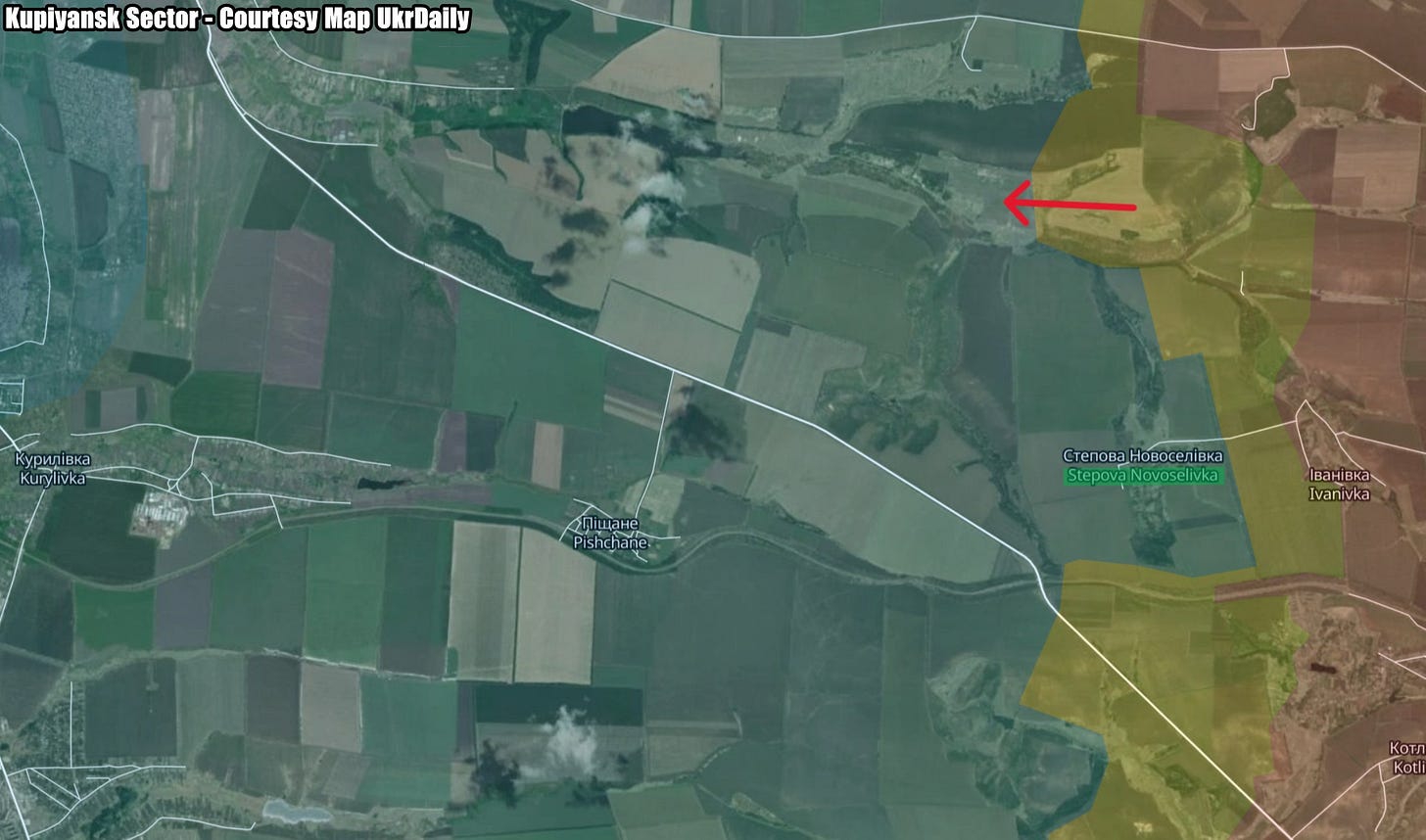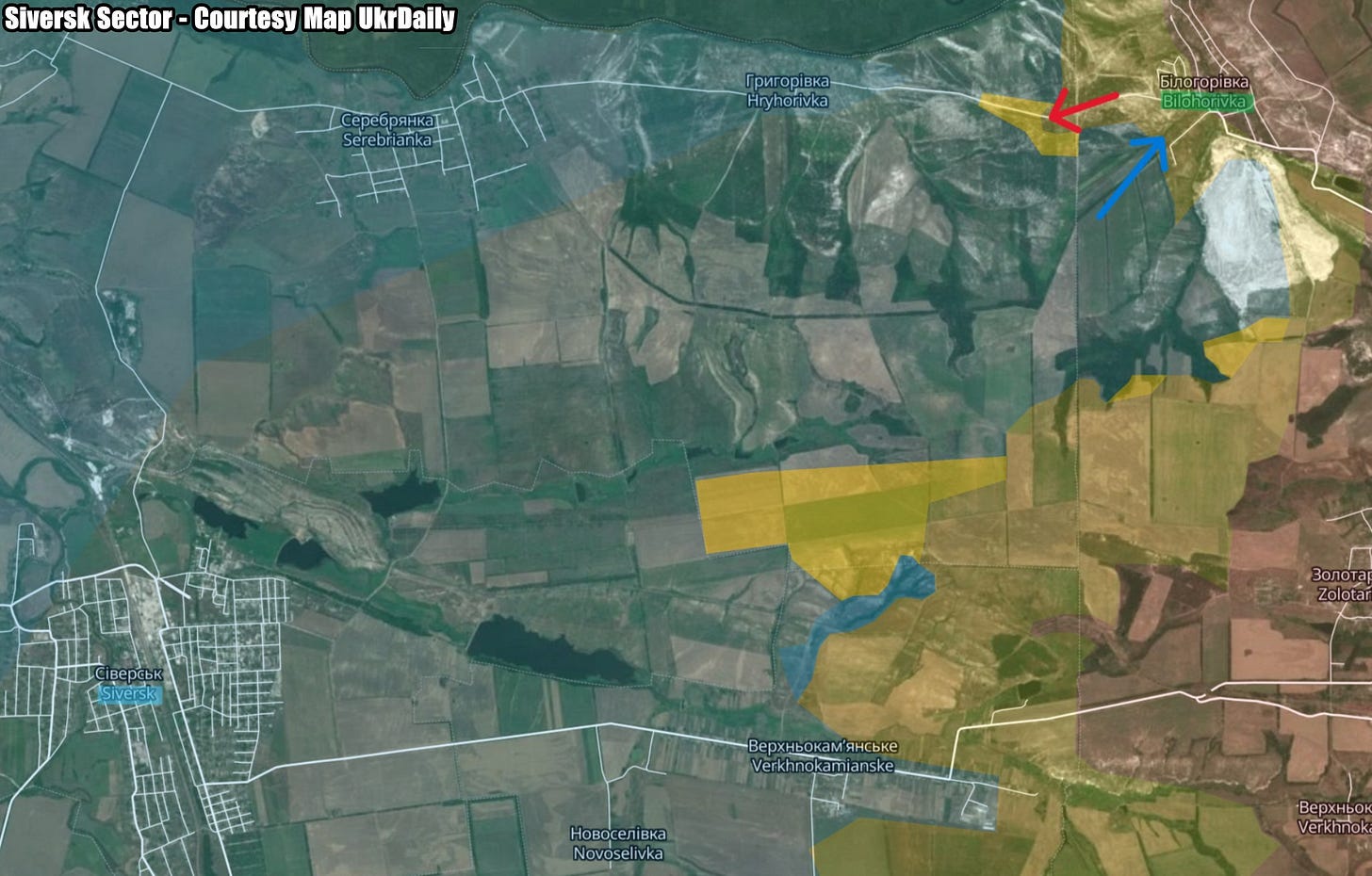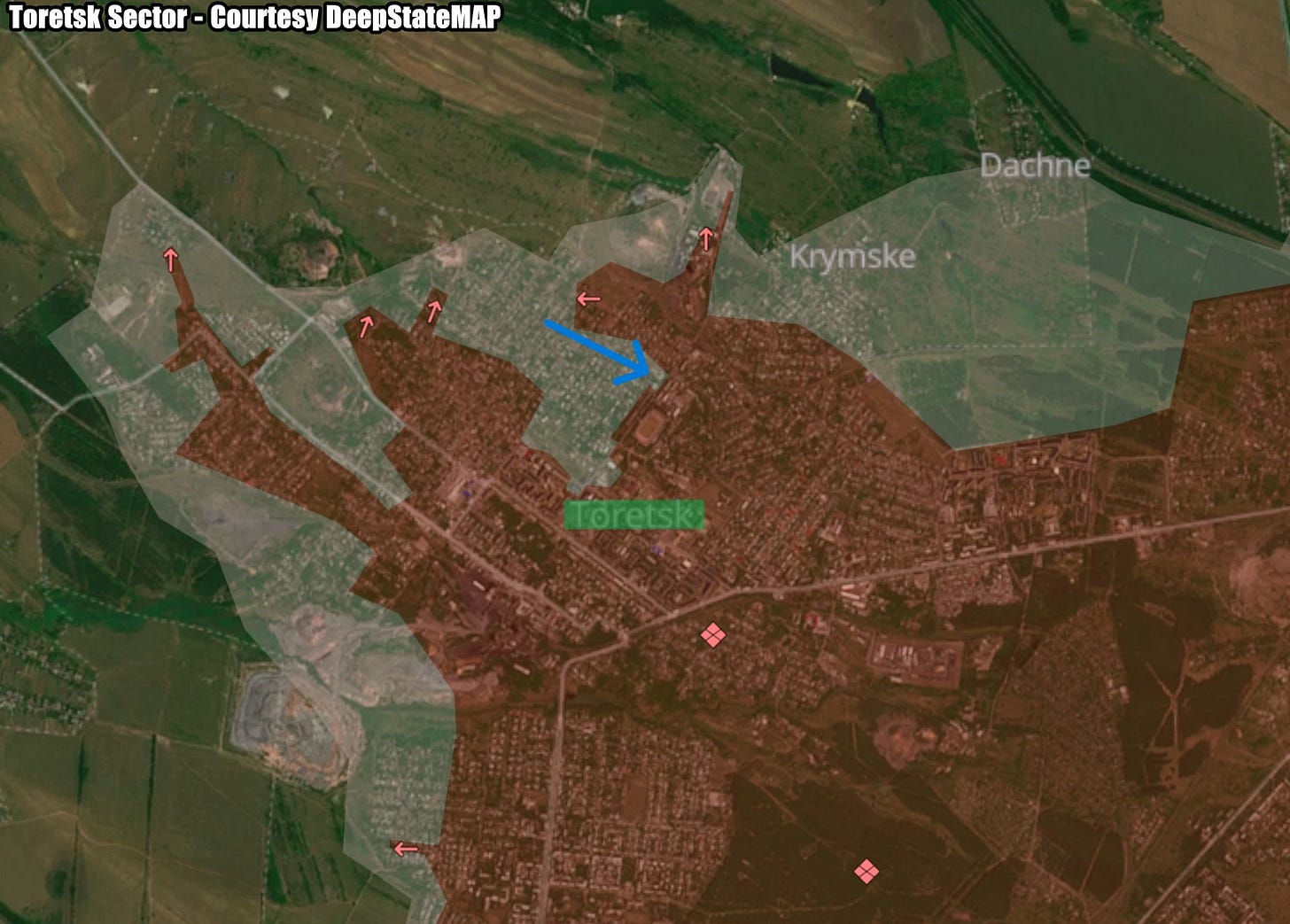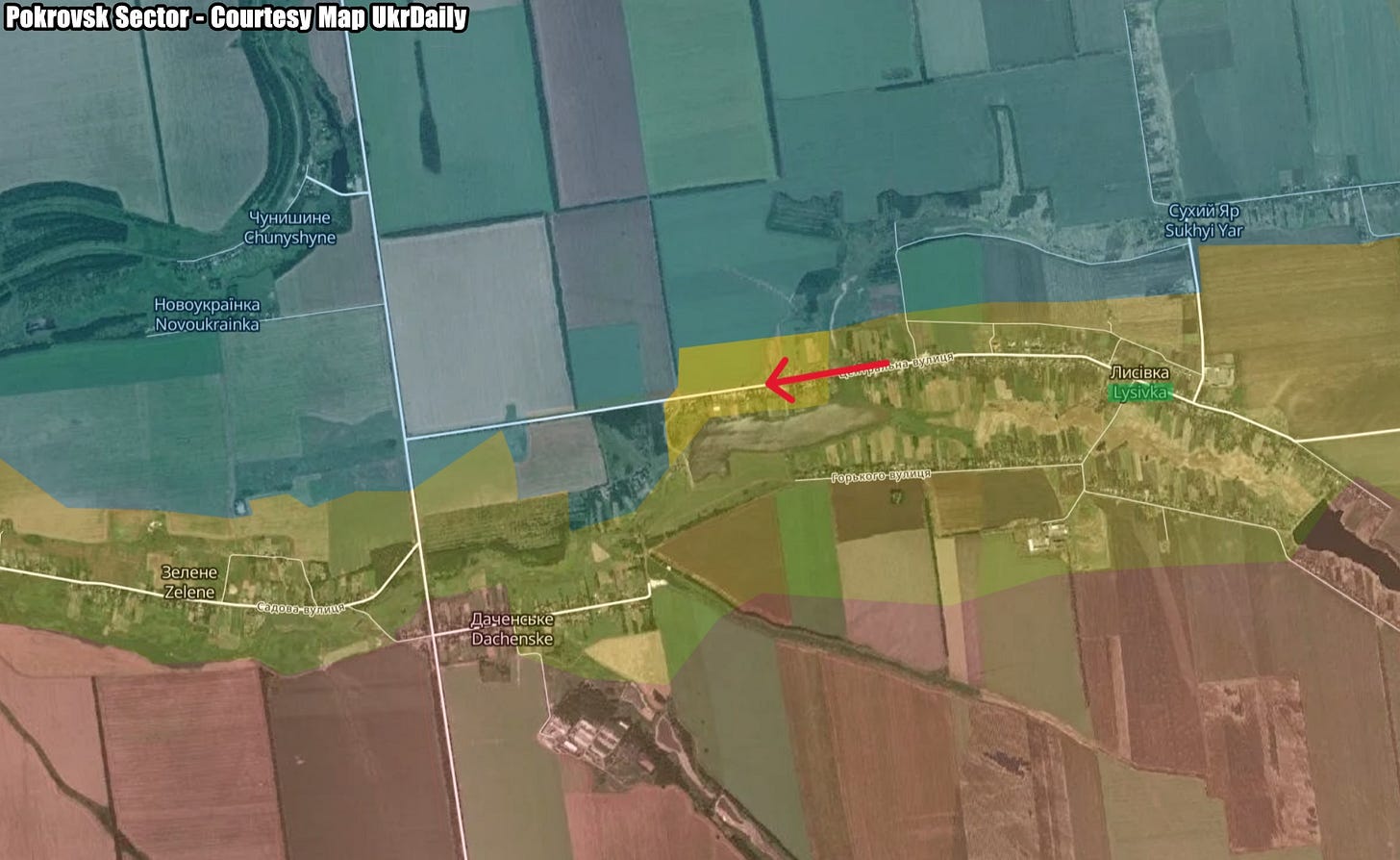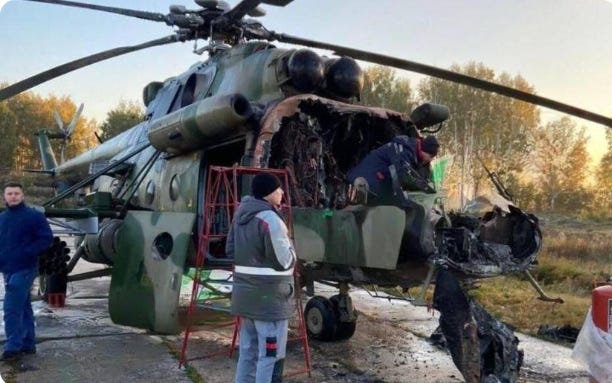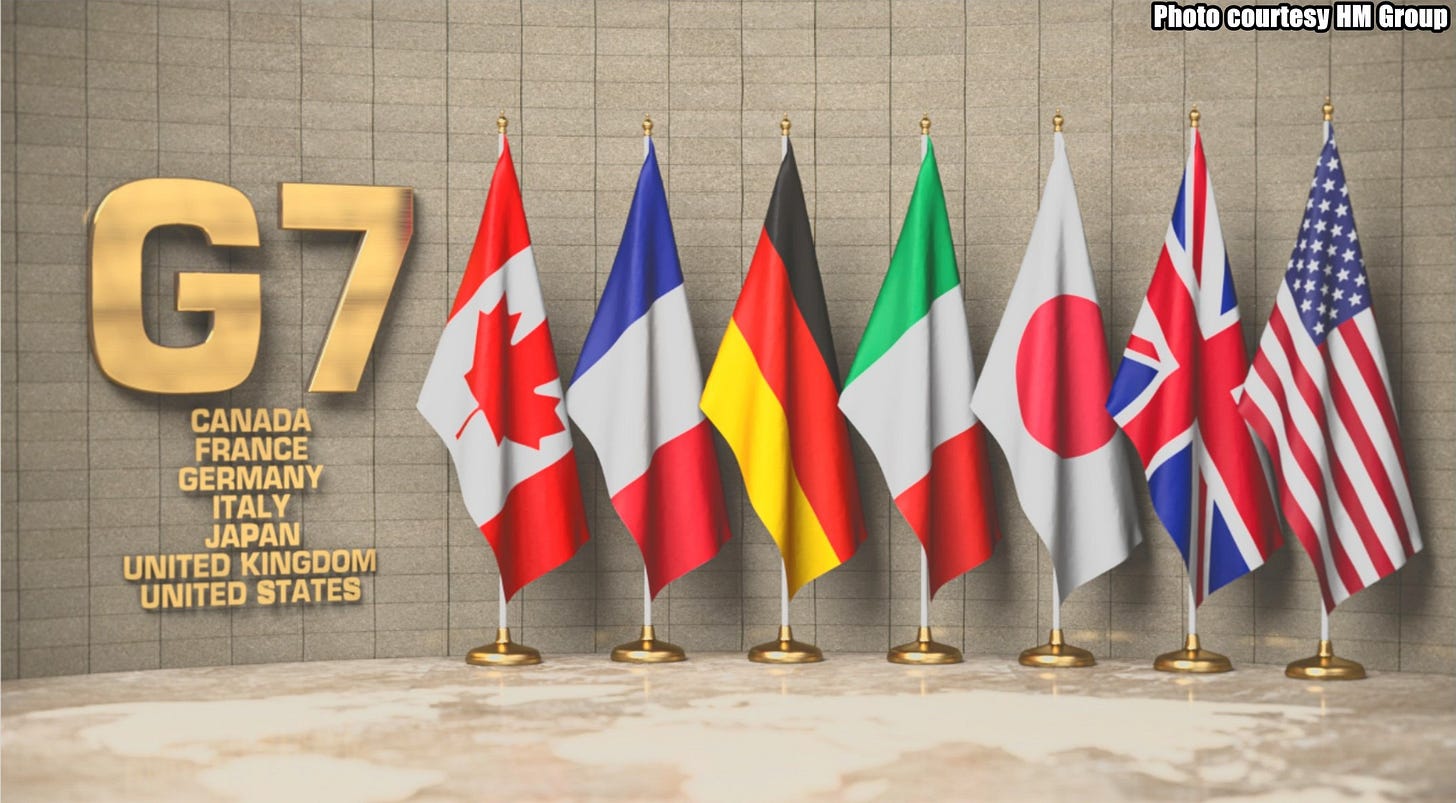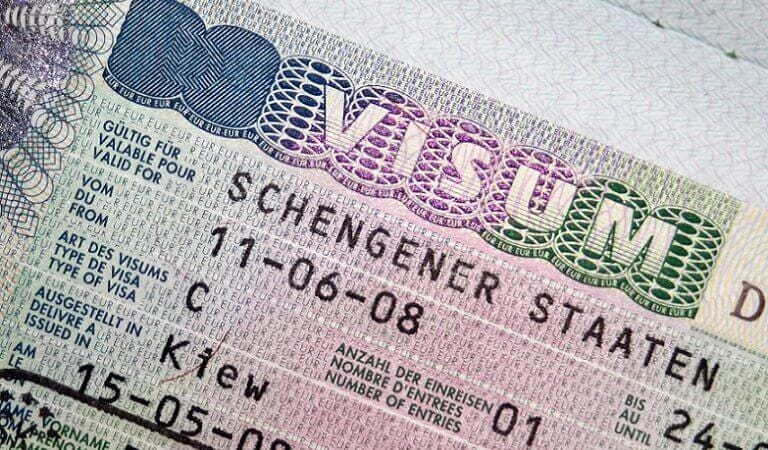Slava Ukraini! In early 2022 I began a Telegram channel aggregating news from a number of sources daily on the war in Ukraine. In June 2023 I began providing a daily draft for the Ukraine War Brief Podcast collecting news from over 70 sources daily, which formed the basis of the script. While the Podcast no longer exists I have continued to make this Brief available for my followers here on Substack for those who wish to keep up with the news from the war.
All the latest news on the Russo-Ukraine War 6 days per week
ALONG THE CONTACT LINE
GSAFU Morning Report
For: Apr 15,2025
The General Staff of the Armed Forces of Ukraine in its Operational Information update at 08:00 on Apr 15 stated that day 1147 of the full-scale invasion of the Russian Federation against Ukraine had begun.
The situation on the line of combat remains tense in some sectors. Ukrainian defenders continue to actively counteract the Russian aggressor, causing them significant losses in personnel, equipment and technology. Exhausting the enemy along the entire front line and continuing to disrupt the plans of Russian occupiers to advance deeper into the territory of Ukraine.
During the past day, 99 combat engagements took place.
Over the past 24 hours, the enemy carried out 1 missile strike, 119 air strikes, used 3,275 drones and fired approximately 6950 artillery shells across the positions of Ukrainian forces and civilians.
Air Force Daily Report
26 ENEMY UAVS SHOT DOWN, 19 SIMULATOR UAVS FAILED TO REACH THEIR TARGETS (LOCATIONALLY LOST)
➖➖➖➖➖➖➖➖➖
On the night of April 15 (from 7:30 p.m. on April 14), the enemy attacked with an Iskander-M/KN-23 ballistic missile (from the Kursk region - Russia) and 52 Shahed attack UAVs and simulator drones of various types from the directions: Millerovo, Primorsko-Akhtarsk - Russia.
The air attack was repelled by aviation, anti-aircraft missile troops, electronic warfare units, and mobile fire groups of the Defense Forces of Ukraine.
As of 12:00, it has been confirmed that 26 Shahed attack UAVs (and other types of drones) have been shot down in the east, north, and center of the country.
19 enemy drones-simulators - lost in location (without negative consequences).
Sumy and Donetsk regions suffered as a result of the enemy attack.
Combat Operations in the Russian Federation
The Institute for the Study of War (ISW), a US based think tank, in its Apr 14 Russian Offensive Campaign Assessment reported that:
Kursk Salient: Russian forces recently advanced in Kursk Oblast amid continued efforts to push Ukrainian forces out of their limited remaining positions in the area.
Geolocated footage published on Apr 13 indicates that Russian forces recently advanced southwest of Guyevo (south of Sudzha).
Belgorod Incursion: Fighting continued in northwesternmost Belgorod Oblast on April 14, but Russian forces did not make confirmed advances.
The Khortytsia operational-strategic group
(Responsible for the northeastern part of Ukraine. )
Kupyansk Sector: Russian forces recently advanced in the Kupyansk direction.
Geolocated footage published on Apr 13 indicates that Russian forces recently advanced northwest of Stepove Novoselivka (southeast of Kupyansk).
Siversk Sector: Ukrainian and Russian forces recently advanced in the Siversk direction.
Geolocated footage published on Apr 13 indicates that Ukrainian forces recently advanced southwest of Bilohorivka (northeast of Siversk).
Geolocated footage published on Apr 13 indicates that Russian forces recently advanced west of Bilohorivka (northeast of Siversk).
Toretsk Sector: Ukrainian forces recently advanced within and northeast of Toretsk.
Geolocated footage published on Apr 9 indicates that Russian forces recently advanced along Korolenka Street in northwestern Toretsk.
The Tavria operational-strategic group
(Responsible for the central-eastern and southeastern part of Ukraine.)
Pokrovsk Sector : Russian forces recently advanced in the Pokrovsk direction.
Geolocated footage published on Apr 13 indicates that Russian forces recently marginally advanced in western Lysivka (southeast of Pokrovsk).
The Odesa operational-strategic group
(Responsible for Kherson, Qırım, (also known as Crimea) and the Black Sea.)
There have been no major changes to the combat environment since our last report.
TEMPORARILY OCCUPIED TERRITORIES
Nothing major to report.
THE HOME FRONT
Ukraine says new Russian missile, bomb attack hits Sumy, after strike kills 35.
Ukraine's Air Force said a new Russian missile and guided bombs targeted the city of Sumy in northeastern Ukraine on Monday evening, a day after a missile strike killed 35 people in the city, Reuters reported on Apr 14.
Local officials said the missile strike occurred on the outskirts of the city and reported no casualties. Checks were being conducted to determine the extent of any damage.
Russia's Defence Ministry said two of its missiles had struck a meeting of Ukrainian military officers on Sunday in Sumy. Ukraine called the strike a deliberate attack on civilians.
On Monday evening, a Ukrainian Air Force statement said a missile had been launched on Sumy and within 20 minutes, a second statement said Russian aircraft were launching guided bombs on the city.
Public broadcaster Suspilne reported an explosion, with no further details.
Ukrainian President Volodymyr Zelenskiy, speaking in his nightly video address, said the casualty toll in Sunday's strike had reached 35 dead and 119 injured. Forty people were in hospital, with 11 in serious condition.
Zelenskyy said nearly 50 countries and international organisations had sent messages of support.
In a statement, Russia's Defence Ministry accused Ukraine of using civilians as human shields by placing military facilities and holding events involving soldiers in the centre of a densely populated city.
There was no immediate response from Kyiv to the human shield accusation.
Foreign Minister Andrii Sybiha said Russian attacks on Sumy and the city of Kryvyi Rih showed Russian President Vladimir Putin was seeking a continuation of war, not an end to it. The Kremlin says Russia is willing to seek a lasting peace that addresses what it calls the root causes of the conflict.
The Russian statement said its forces had fired "two Iskander-M tactical missiles at the meeting venue" of what it called an operational tactical group of Ukraine's armed forces. It claimed more than 60 Ukrainian soldiers were killed in the strike.
Russian presidential spokesperson Dmitry Peskov was asked at his daily briefing how the Kremlin viewed Trump's comment and whether the strike had been conducted in error.
"I can only repeat and remind you of the repeated statements of both our president and our military representatives that our military strikes exclusively at military and military-adjacent targets," he said.
NATO's Rutte visits Odesa, says support for Ukraine unwavering.
NATO Secretary-General Mark Rutte said he had visited the southern Ukrainian city of Odesa with President Volodymyr Zelenskiy on Tuesday and declared NATO's support for Ukraine was unwavering. Reuters reports.
Rutte's visit was a show of solidarity with Kyiv following a Russian missile strike on the northern city of Sumy on Sunday that killed 35 people and wounded more than 100.
"Ukraine’s people have endured so much - not least Russia's Palm Sunday attack on Sumy. NATO support is unwavering," Rutte said in a post on twitter.
"We will continue to help Ukraine so it can defend today and deter future aggression, ensuring a just and lasting peace."
The trip took place as the United States - NATO's dominant power - is seeking to broker a ceasefire between Russia and Ukraine and it followed fresh criticism of Zelenskyy by U.S. President Donald Trump.
Zelenskyy said he and Rutte had visited a hospital where Ukrainian soldiers were recovering from their wounds.
"We spoke with our warriors. I presented state awards to our defenders. I am grateful to our guys for their strength, resilience, and for protecting our people," he said on twitter.
"I also presented awards to the combat medics," he added. "I thank everyone who defends, treats, endures, and supports Ukraine. You are our strength."
RUSSIAN WORLD
Russia jails soldier for 15 years for voluntarily surrendering to Ukraine.
A Russian military court on Tuesday jailed a soldier for 15 years after convicting him of desertion and voluntary surrender to Ukraine, Russia's first such prosecution, Russian propaganda source Kommersant reported.
Russia in September 2022 introduced the crime of voluntary surrender, which is punishable by between three and 10 years in prison.
According to Kommersant, a court on the far eastern Russian island of Sakhalin found soldier Roman Ivanishin guilty of voluntary surrender, of attempting to voluntarily surrender, and of desertion.
Ivanishin, who was reported to have denied all the charges, will serve his sentence in a maximum security facility.
His trial was held behind closed doors.
The newspaper reported that Ivanishin, a miner on Sakhalin in civilian life whom local media described as a veteran of Russia's wars in Chechnya, was mobilised in 2022 and fought in Ukraine's eastern Donetsk region.
He was captured by Ukrainian soldiers in June 2023 and, in a video published on the internet, was shown denouncing Russia's military campaign in Ukraine and calling on other soldiers to desert.
It was not clear from the report in Kommersant whether he had been speaking under duress in the video. His defence team was reported to have sought his acquittal, saying there was no evidence he had committed any crime.
Ivanishin was returned to Russia in a prisoner exchange in January 2024 and was placed under investigation, Kommersant said.
Russian court jails five for helicopter arson and sabotage 'at Ukraine's behest.
A Russian military court on Tuesday sentenced five people for up to 18 years in jail after finding them guilty of setting fire to railway infrastructure and a helicopter outside Moscow last year, the TASS state news agency reported.
TASS cited state prosecutors as saying that the group had acted on the orders of people close to Ukraine's GUR military intelligence agency.
GUR posted a video at the time purporting to show the helicopter, which it said belonged to the Russian Defence Ministry, on fire. But it did not claim responsibility for the attack.
The court, which held its proceedings behind closed doors, was cited as saying that the defendants - four men and one woman - had set fire to a railway relay box and had later torched a search and rescue helicopter parked at the Ostafyevo airfield outside Moscow in April 2024.
Authorities swiftly arrested the five, who were between 19 and 22 years old at the time and all originally from the city of Norilsk in northern Russia. They were charged with sabotage and terrorism, TASS reported. It was not clear how they had pleaded.
Russian investigators were quoted as saying that one of the men had been recruited by Ukraine's intelligence services and had organised the attacks.
Russian officials have linked Ukraine-directed sabotage groups with numerous attacks on aircraft and railways aimed at disrupting Moscow's war effort since the full-scale conflict began over three years ago.
RELATED INTERNATIONAL NEWS
US blocking G7 statement denouncing Russia's Sumy strike.
The U.S. has told the other G7 members it would not support a joint statement condemning Russia's deadly attack on Sumy last week so as not to disrupt peace efforts, Bloomberg reported on April 15, citing undisclosed sources.
Russia launched the missile attack against the northeastern city on Palm Sunday on April 13, killing 35 people and injuring 119. It marked one of the worst attacks against Sumy throughout the full-scale war.
Canada, currently chairing the G7 group, reportedly told other members that the statement could not be adopted without U.S. support. According to Bloomberg, the statement was to denounce Russia's attack as evidence that Moscow is determined to continue its war.
While European leaders have denounced the attack as a war crime, Trump adopted a softer tone, saying that while the strike was "terrible," it likely occurred by "mistake," without elaborating further.
U.S. Secretary of State Marco Rubio offered condolences to the victims of the "horrifying Russian missile attack on Sumy" but stopped short of calling for an increasing pressure on Russia.
The move is only the latest in the string of Washington's steps undermining G7 unity on Russia and Ukraine. The Trump administration has previously opposed a joint statement on the third anniversary of Russia's full-scale war and vetoed a proposal for a task force tracking the Russian "shadow fleet" of tankers.
Since taking office in January, Trump has upended years of U.S. foreign policy on the Russia- Ukraine war, resuming direct contact with Moscow while exerting pressure on Kyiv by temporarily cutting off crucial military aid.
Trump has pledged to broker a swift ceasefire between Russia and Ukraine, but these efforts have largely stalled as Moscow rejects a 30-day truce supported by Washington and Kyiv. Despite these delays, Trump has yet to exert additional pressure on Russia.
Poland, Czechia reportedly push to restrict Russian diplomats' movement in Schengen.
Poland and Czechia are spearheading efforts to restrict the free movement of Russian diplomats within the Schengen Area, citing concerns over espionage and sabotage, Polish media Rzeczpospolita reported on April 15, citing undisclosed officials.
The initiative originated in Prague in November 2023, when Czech authorities called for a ban on the movement of Russian diplomats they allege are agents of the Russian military intelligence (GRU) and other intelligence services.
By June 2024, Denmark, Estonia, Latvia, Lithuania, the Netherlands, Poland, and Romania had joined the Czech appeal, submitting a joint letter to then-EU foreign policy chief Josep Borrell. Former NATO Secretary General Jens Stoltenberg publicly supported the effort.
The proposal calls for limiting Russian diplomats to their consular districts, a restriction already implemented in Poland. Currently, 21 Russian diplomats remain in the country — a third of the pre-2022 number — confined to Warsaw, Gdansk, and Krakow.
"Any idea that makes it harder for the Russians to conduct intelligence activities in Poland and the European Union is justified," said Colonel Jacek Maka, former head of Poland’s ABW counterintelligence service, in comments for Rzeczpospolita.
"This is not about diplomacy. These are de facto spies."
The Schengen Area, comprising 27 European nations, allows for passport-free travel across borders. If adopted, the proposed restrictions would mark a rare rollback of that freedom, reflecting growing security concerns across the bloc.
Tensions have risen sharply amid suspected Russian sabotage on EU territory. Lithuanian authorities believe Russian intelligence orchestrated arson attacks on an IKEA warehouse in Vilnius and a shopping center in Warsaw in 2024.
Polish and Lithuanian investigators said Ukrainian nationals, allegedly recruited by Russian operatives, carried out the attacks. One suspect is a minor.
Western officials have warned of coordinated Russian efforts to destabilize European countries that support Ukraine. Intelligence services across NATO have reported an uptick in Russian sabotage and infiltration operations since the full-scale invasion of Ukraine began in 2022.
EU readies 'plan B' for bypassing Hungary's Russia sanctions veto.
EU legal experts are exploring a potential method of preventing Hungary from derailing the extension of sanctions imposed on Russia this July, Radio Free Europe/Radio Liberty reported on April 15.
The European bloc has adopted 16 packages of sanctions on Russia since the outbreak of the full-scale invasion of Ukraine in 2022.
Since their extension requires a unanimous approval every six months, Hungary, broadly seen as the most Moscow-friendly EU member, has repeatedly threatened to derail the process while extracting exemptions from listings.
One of the main options Brussels has for bypassing Hungary's veto is to leave the sanctions in effect without the formal extension.
The EU sanctions consist of two documents adopted one after another: a decision and a regulation. While a regulation must by extended by all 27 members every six months, a decision remains in force until a qualified majority repeals it, RFE/RL wrote.
This would mean that the already-imposed decision on sanctions would remain in force without the need for extension — an unprecedented move that would open the door to legal challenges.
This method is reportedly not the only one on the table. Another option under consideration is that the upcoming 17th sanctions package would not be actually adopted but instead "horse-traded" with Hungary for the extension, RFE/RL reported.
The EU could also potentially let the sanction lapse but instead raise tariffs on Russia, a decision that does not require unanimity, or adopt mirroring sanctions on national levels.
The European bloc has sanctioned some 2,500 individuals and entities as part of its sanctions against Russia. Measures like visa bans and asset freezes are reviewed in March and September, while sanctions like import bans are renewed in January and July.
Brussels managed to negotiate an extension of sanctions in March despite Hungary's veto threats. Hungarian Prime Minister Viktor Orban, who has obstructed aid to Kyiv and sanctions against Russia for the past three years, has been further emboldened by the election victory of U.S. President Donald Trump.
Orban argues that Trump's push toward peace, which so far has included mostly pressure against Ukraine, means the EU must also abandon its military support for Kyiv and reopen dialogue with Moscow.
The Trump administration has suggested that the lifting of sanctions, including those imposed by the EU, would have to be part of an eventual peace settlement.
MILITARY & TECH
Ukraine Begins Developing Strategic Air Defense System, Invites EU to Join the Effort.
Ukraine has officially invited European Union countries to join the development of a long-range air defense system capable of engaging targets over 100 km away — a project now classified as a strategic-level air defense system, Defense Express reports.
The announcement was made by Ukraine’s Deputy Foreign Minister Andriy Sybiha during the EU Foreign Affairs Council on April 14.
The term “strategic air defense” is used by major defense contractors like Raytheon to describe systems such as the SM-6 (range up to 370 km) or SM-3, which is designed for exo-atmospheric ballistic missile interception.
In theory, this suggests that Ukraine could be working on a surface-to-air missile system even more capable than the Patriot, especially if it aims for a capability similar to the SM-6. While some classify the Patriot as a strategic system, this level of ambition places Ukraine’s project above systems like the French-Italian SAMP/T, particularly in terms of range.
Just days earlier, Ukraine’s Minister for Strategic Industries, Herman Smetanin, confirmed that domestic defense firms are actively working on a Ukrainian equivalent to the Patriot system.
While little is known about the current stage of the new project, the concept has been discussed for years. Since 2022, its development could have received top priority, meaning the system might quietly enter service — much like the previously undisclosed Ukrainian so-called “Long Neptune” missile.
Ukraine’s invitation to EU states is also a strategic move in terms of industrial cooperation. The defense sector, after all, is a business. That said, it’s unlikely that countries currently investing in rival programs would join the Ukrainian initiative. For instance:
• France and Italy are heavily invested in finalizing the SAMP/T NG system, with missile production handled by MBDA — owned by Airbus, BAE Systems, and Leonardo.
• Germany has already ordered the Israeli-made Arrow 3 and is expanding joint German-Israeli defense programs, including attempts to revive an APKWS-like missile.
• Poland has committed over $15 billion for Patriot systems, reducing the likelihood of its interest in alternative programs.
However, there may be real potential among other European countries that possess both funding and in-house technological capabilities.
One such example is Sweden’s Saab, which produces advanced radar systems like the Giraffe 4A, but currently only fields theRBS-70 MANPADS. Despite Sweden having purchased four limited-scale Patriot batteries (just three launchers each, with only 200 missiles for $1.3 billion), Saab may see value in participating in a broader European strategic air defense project.
Another possibility is Norway’s Kongsberg, which currently cooperates with Ukraine on integrating Ukrainian missiles into the NASAMS system. For Kongsberg, joining the development of a long-range or strategic system would represent a significant upgrade from its current short- and medium-range capabilities — especially since Norway lacks any long-range or strategic air defense assets of its own, while sharing a border with Russia.
That’s it for today’s Brief folks if you would like to keep up with events in Ukraine daily please consider subscribing, it’s free!


